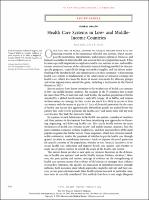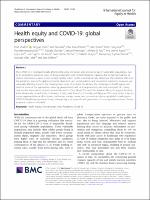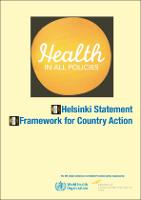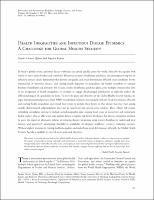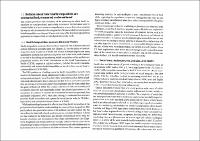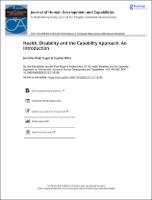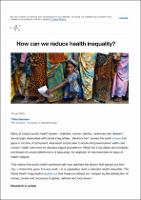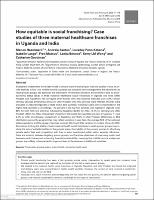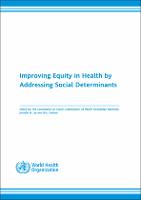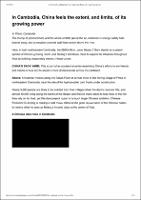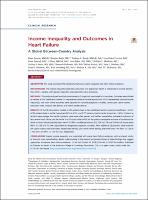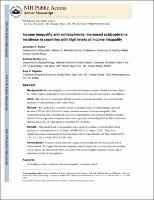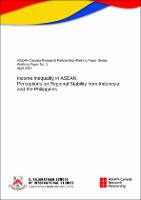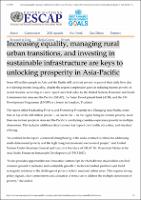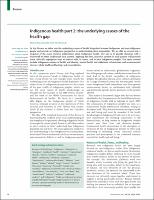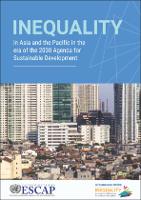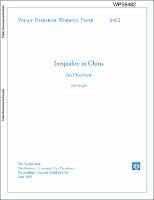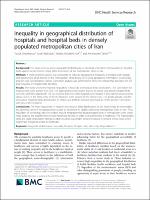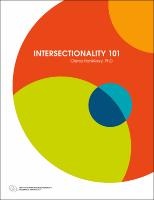Browsing 1. Health Equity by Title
Now showing items 77-96 of 157
-
Health care systems in low- and middle-income countries
(Massachusetts Medical Society, 2014-02-06)
This review draws on what is now quite an extensive literature on the deficiencies of health care systems and on the Health Systems Evidence database. However, the poor quality and uneven coverage of evidence on the strengthening of health care systems means that evidence of deficiencies is stronger than evidence of remedies. Moreover, the specific circumstances of individual countries strongly influence both decisions about which approaches might be relevant and their success, so any generalizations made from health systems research in particular ... -
Health equity and COVID-19: global perspectives
(2020-12)
The COVID-19 is disproportionally affecting the poor, minorities and a broad range of vulnerable populations, due to its inequitable spread in areas of dense population and limited mitigation capacity due to high prevalence of chronic conditions or poor access to high quality public health and medical care. Moreover, the collateral effects of the pandemic due to the global economic downturn, and social isolation and movement restriction measures, are unequally affecting those in the lowest power strata of societies. To address the challenges to ... -
Health in all policies: Helsinki statement. Framework for country action
(World Health Organization, 2021)
The participants to the 8th Global Conference on Health Promotion endorsed the Helsinki Statement on Health in All Policies In which they prioritize health and equity as a core responsibility of governments to its peoples, affirm the compelling and urgent need for effective policy coherence for health and well-being and recognize that this will require political will, courage and strategic foresight. The participants of the Conference call on governments to fulfill their obligations to their people’s health and wellbeing by taking a number of ... -
Health Inequalities and Infectious Disease Epidemics: A Challenge for Global Health Security
(2014)
In today's global society, infectious disease outbreaks can spread quickly across the world, fueled by the rapidity with which we travel across borders and continents. Historical accounts of influenza pandemics and contemporary reports on infectious diseases clearly demonstrate that poverty, inequality, and social determinants of health create conditions for the transmission of infectious diseases, and existing health disparities or inequalities can further contribute to unequal burdens of morbidity and mortality. Yet, to date, studies of influenza ... -
Health inequalities: critical perspectives
(Oxford University Press, 2016)
This section provides a brief summary of the main ways in which health in-equalities are conceptualized, particularly in terms of the indicators used to stratify health. It is by no means a comprehensive account but rather considers the ways in which researchers focusing on the UK have tended to conceptualize health inequalities over the past 30 years and some of the key chalenges to these approaches (critiques which are developed later in this book). -
Health, Disability and the Capability Approach: An Introduction
(Journal of Human Development and Capabilities, 2015)
This special issue of the Journal of Human Development and Capabilities focuses on two areas of substantial and growing importance to the human development and capability approach: disability and health. The research on disability, health and the capability approach has been diverse in the topics it covers, and the conceptual frameworks and methodologies it uses, beginning over a decade and a half ago in health (Ruger 1998) and more than a decade ago in disability (Baylies 2002).1 We are pleased to share a set of articles in these two areas. ... -
How can we reduce health inequality?
(2015-01-19) -
How Countries in Southeast Asia are Working Together to Accelerate Human Capital Development
(THE WORLD BANK, 2019) -
How equitable is social franchising? Case studies of three maternal healthcare franchises in Uganda and India
(Oxford University Press in association with The London School of Hygiene and Tropical Medicine, 2018-04-01)
Substantial investments have been made in clinical social franchising to improve quality of care of private facilities in low- and middle-income countries but concerns have emerged that the benefits fail to reach poorer groups. We assessed the distribution of franchise utilization and content of care by socioeconomic status (SES) in three maternal healthcare social franchises in Uganda and India (Uttar Pradesh and Rajasthan). We surveyed 2179 women who had received antenatal care (ANC) and/or delivery services at franchise clinics (in Uttar Pradesh ... -
Improving equity in health by addressing social determinants
(World Health Organization, 2011)
This recently published book highlights actions to improve health equity based on findings from the nine global Knowledge Networks that were established during the WHO Commission on Social Determinants of Health. Their task was to synthesize existing evidence and identify effective and appropriate actions to improve health equity in nine thematic areas: - globalization; - gender; - social exclusion; - early child development; - urban settings; - employment conditions; - health systems; - public health programs; and - measurement and evidence. ... -
In Cambodia, China feels the extent, and limits, of its growing power
(Washington post, 2015) -
Income Inequality and Outcomes in Heart Failure
(2019)
OBJECTIVES This study examined the relationship between income inequality and heart failure outcomes. BACKGROUND The income inequality hypothesis postulates that population health is influenced by income distribution within a society, with greater inequality associated with worse outcomes. METHODS This study analyzed heart failure outcomes in 2 large trials conducted in 54 countries. Countries were divided by tertiles of Gini coefficients (where 0% represented absolute income equality and 100% represented absolute income inequality), and heart ... -
Income inequality and schizophrenia: Increased schizophrenia incidence in countries with high levels of income inequality
(2014-03)
Background—Income inequality is associated with numerous negative health outcomes. There is evidence that ecological level socio-environmental factors may increase risk for schizophrenia. Aims—The aim was to investigate whether measures of income inequality are associated with incidence of schizophrenia at the country level. Method—We conducted a systematic review of incidence rates for schizophrenia, reported between 1975 and 2011. For each country, national measures of income inequality (Gini coefficient) along with covariate risk factors for ... -
Income Inequality in ASEAN: Perceptions on Regional Stability from Indonesia and the Philippines
Income inequality has been a growing concern since Global Financial Crisis. But how do regional institutions contribute to the debate on income equality? ASEAN’s normative framework is underpinned by the principle of non-interference while ASEAN has a mandate to establish an equitable economic community post 2015. This study examines if regional income inequality is considered a regional problem, and if so, is the concern significant enough to overcome the principle of non-interference allowing ASEAN to play a greater role in policy formation. ... -
Indigenous health part 2: the underlying causes of the health gap
(The Lancet, 2009) -
Inequality in Asia and the Pacific in the era of the 2030 Agenda for Sustainable Development
(United Nations, 2018)
This publication reviews the region's inequality trends, challenges and achievements and identifies policy gaps across the three dimensions of inequality--inequality of outcome, inequality of opportunity and inequality of impact. It also discusses the potential impact of rapid and disruptive technological advances, such as machine learning, and puts forward a broad set of policy recommendations for reducing all forms of inequality for the effective implementation of the 2030 Agenda for Sustainable Development and its core tenant of "leaving no ... -
Inequality in China
(Oxford University Press, 2014-10-30)
This paper provides an overview of research on income inequality in China over the period of economic reform. It presents the results of two main sources of evidence on income inequality and, assisted by various decompositions, explains the reasons income inequality has increased rapidly and the Gini coefficient is now almost 0.5. This paper evaluates the degree of income inequality from the perspectives of people’s subjective well-being and government concerns. It poses the following question: has income inequality peaked? It also discusses the ... -
Inequality in geographical distribution of hospitals and hospital beds in densely populated metropolitan cities of Iran
(BMC Health Serv Res, 2019-12)
Background: This study aims to assess geographical distribution of hospitals and extent of inequalities in hospital beds against socioeconomic status (SES) of residents of five metropolitan cities in Iran. Methods: A cross-sectional analysis was conducted to measure geographical inequality in hospital and hospital bed distributions of 68 districts in five metropolitan cities during 2016 using geographic information system (GIS), and Gini and Concentration indices. Correlation analysis was performed to show the relationship between the SES and ... -
INTERSECTIONALITY 101
(Institute for Intersectionality Research and Policy)
Interest in and applications of intersectionality have grown exponentially in popularity over the last 15 years. Scholars across the globe from a variety of disciplines, including sociology, political science, health sciences, geography, philosophy and anthropology, as well as in feminist studies, ethnic studies, queer studies and legal studies, have drawn on intersectionality to challenge inequities and promote social justice. This practice has also extended to policy makers, human rights activists and community organizers search - ing ...

